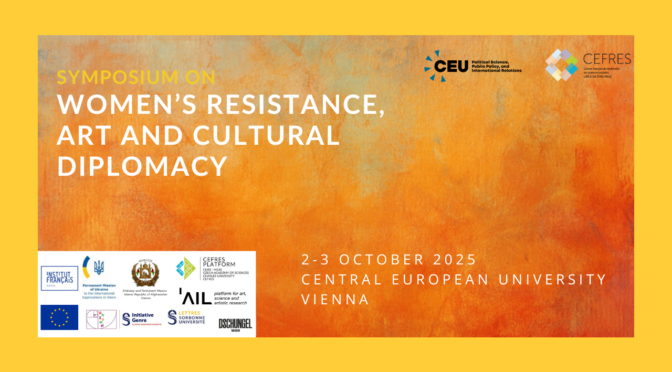This symposium is jointly organised by the Central European University & The French Research Centre for Social Sciences and Humanities, Prague, (CEFRES).
Date: Octobre 2-3, 2025
Location: CEU Campus, Quellenstrasse 51, Vienna
Language: English
Convenors: Valeriya Korablyova, Louisa Martin-Chevalier & Seema Sridhar
See the program of the event here.
The symposium aims to bring together a variety of perspectives on creative expressions of women’s resistance through art and cultural diplomacy by engaging with academics, activists and conflict-affected artists. The event centres around insights from diplomats; scholars specialising in diverse academic streams on feminist scholarship, creative research methods, musicology; activists working with supporting and promoting exiled artists; and conflict-affected artists living in Europe.
Research in musicology and gender studies has shed light on the structural invisibility of women in the musical field — whether as performers, musicians, conductors, composers, sound artists or cultural producers more broadly (McClary 1991; Citron 1993; Cook & Tsou 1994; Green 1997; Ravet 2011; Koskoff 2014 ; Dunbar 2021). However, there remains a significant lack of research on the specific challenges faced by migrant and displaced women musicians, who often encounter additional layers of exclusion. These artists are situated at the intersection of gendered and geopolitical inequalities, particularly in light of the profound global disparities in women’s rights to freely practice music, as shown by the different geographical and cultural spheres presented in this symposium.
In contexts of war and forced displacement, this marginalisation tends to deepen. Wars have a way of awakening stereotypes and gendered roles. Echoing this, recent UN reports confirm that armed conflict exacerbates gender-based inequalities and leads to increased violence against women. In this light, the symposium also seeks to interrogate how women artists — particularly those in exile or in conflict-affected societies — resist both the material violence of war and the symbolic violence of exclusion through their creative practices. Their acts of artistic expression become tools not only of survival and resilience, but of gendered agency and political presence.
Acknowledging the importance foregrounding the artistic journeys of women from conflict-affected regions who continue their fight against authoritarian regimes, violent patriarchy and religious extremism, armed aggression, the symposium would highlight their resilience, creativity, and underscore their crucial role in raising awareness about their cultural heritage which is at risk of being erased, and most importantly their contribution to re-shaping narratives. This is especially crucial in regions where women have been denied the opportunity to pursue arts, music, education, employment, and are being erased from public life.
The discussion would explore ways of enabling marginalised artists’ voices to be heard, amplified and acknowledged in the context of peacebuilding. The programme seeks to illuminate ways in which different forms of women’s artistic expressions have played a role in resisting political violence, challenging existing social norms, transforming gender relations, addressing inequalities, transcending divisions, and creating platforms for peacebuilding and diplomacy. The participants at the intersection of academia, art and activism, shall address how artists have been creating platforms for building bridges with the community that they want to engage with while living in exile, and how they embody non-violent resistance through their artistic pursuits. By foregrounding how women artists organise themselves and promote conflict transformation on various scales, and exercise agency through their work and everyday lives, the symposium would be a strong political statement expressing solidarity with the struggles and accomplishments of women from conflict-affected regions. It seeks to open up a vibrant space for discussion and deliberation on how to move forward with amplifying the voices of artistic resistance through cultural diplomacy.
Program
Thursday, 2 October 2025
8:30 – 9:00 Registration
9.00 -10:00 Welcome to CEU & Opening Remarks
Michael Merlingen, Director, Doctoral School of Political Science, CEU
Mateusz Chmurski, Director, CEFRES, Prague
H.E Manizha Bhaktari, Afghan ambassador to The Republic of Austria
Yurii Vitrenko, Permanent Representative of Ukraine to the International Organizations in Vienna
Rasa Ostrauskaite, EU Permanent Representative to the Organization for Security and Co-operation in Europe
10:00 – 11:30
Panel 1 – Music at the Interstices of Conflict, Identity and Resistance
Louisa Martin-Chevalier, Associate Professor, Sorbonne University
Valeriya Korablyova, Assistant Professor, Charles University
Razia Sultanova, Research Fellow, Cambridge Muslim College, UK
Moderators: CEU faculty/student
11:30 -12:00 Coffee Break
12:00 – 13:30
Panel 2 – Art at the Margins: Inequalities and Negotiated Spaces
Lydia Cole (online), Lecturer, University of Sussex
Guilia Pelilo, Professor, Diplomatische Akademie Wien
Ishraga Hamid, Writer and Human Rights Activist, Vienna
Moderators: CEU faculty/student
13.30 – 14.30 Lunch
14.30 – 16.00
Panel 3: Music, Minorities and Feminist Solidarity
Anja Brunner, Assistant Professor, University of Music and Performing Arts, Vienna
Hyacinthe Ravet, Professor, Sorbonne University, Paris
Ursula Hemetek, Professor, University of Music and Performing Arts, Vienna
Moderators: CEU faculty/student
16:00 – 16:15 Coffee Break
18.00-19:00 Dinner at Dschungel Theatre, Museumsplatz 1, Vienna
19:00 – 20:30 Concert at Dschungel Theatre:
Ukrainian performers Alisa Kobzar and Anna Arkushyna
Performance by Fazila Zamer, Afghan Rubab player (subject to confirmation)
Friday, 3 October 2025
9:30 – 11:00
Panel 4: Art, Affect, and Resistance
Dana Mckelvey, CEU
Seema Sridhar, CEU
Sara Whyatt, Director of NGO, Freemuse, UK
Moderators: CEU faculty/student
11.00 – 11.30 Coffee Break
11.30- 13.00
Panel 5: Creative Methods: Case Studies and Ethical Challenges
Nilanjana Premaratna, Lecturer, Newcastle University
Diana Valencia Duarte, Lecturer, Aberystwyth University
Erzsebet Strausz, Assistant Professor, CEU
Moderator: CEU faculty/student
13:00 -14:00 Lunch
14:00 – 15:30
Panel 6: Intercultural Communication and Transformation
Zsuzsanna Arendas, Research Fellow, CEU, Vienna
Georgia Holmer, Peace and Security Specialist, The Hague, Netherlands
Sophie Raehme, CEU, Vienna
Discussant: CEU Faculty/student
15.30 – 16.00 Coffee Break
16.00 — 17.00 Walking Lab: Feminist History of Vienna
17.30 – 19.00 Performance by Afghan musicians, followed by Reception at Die Angewandte Atrium
Rojin Sharafi, Iranian sound artist
Afghan musician (performances subject to confirmation)
@ Sonja Czeschka Pixabay

